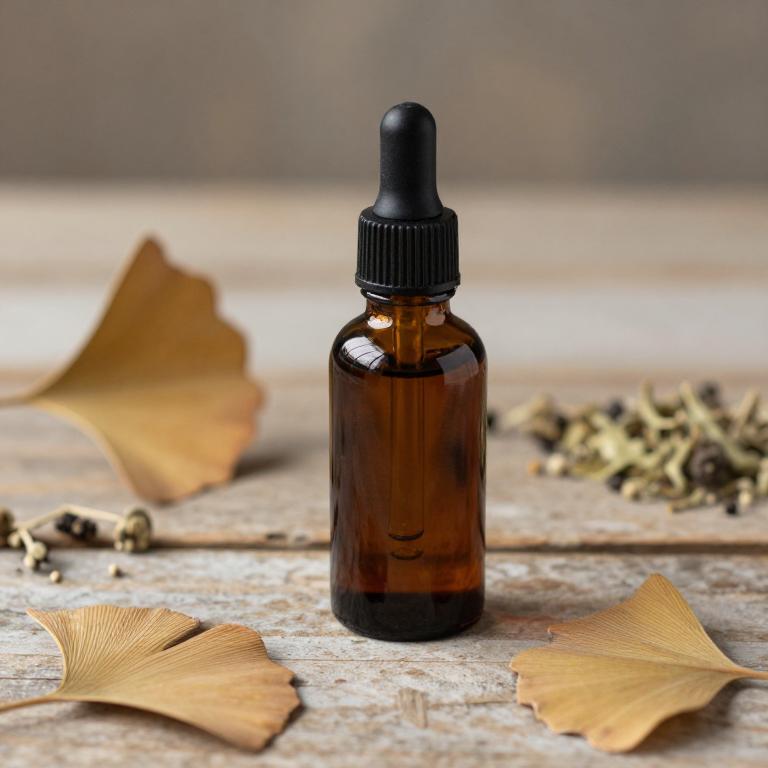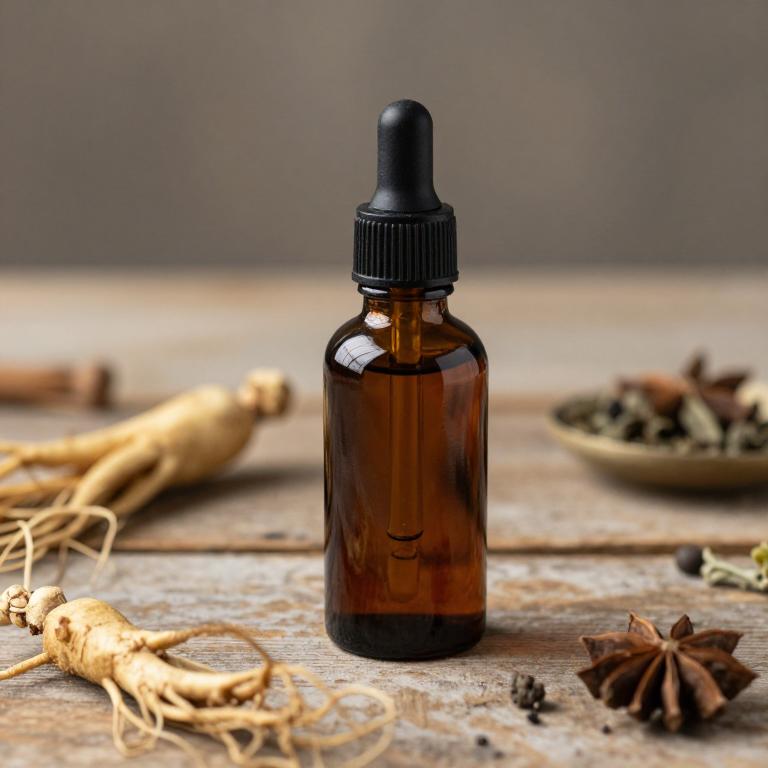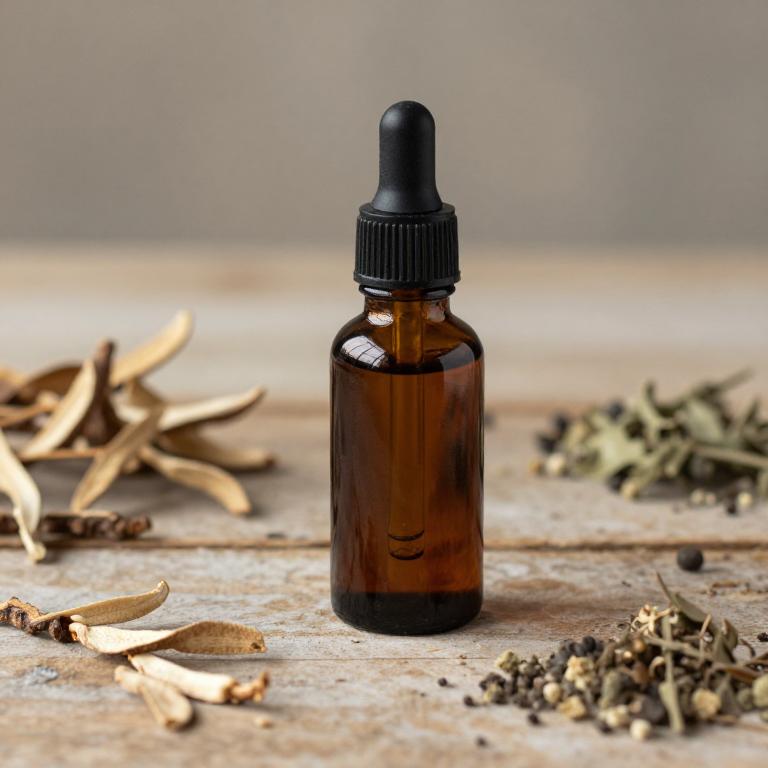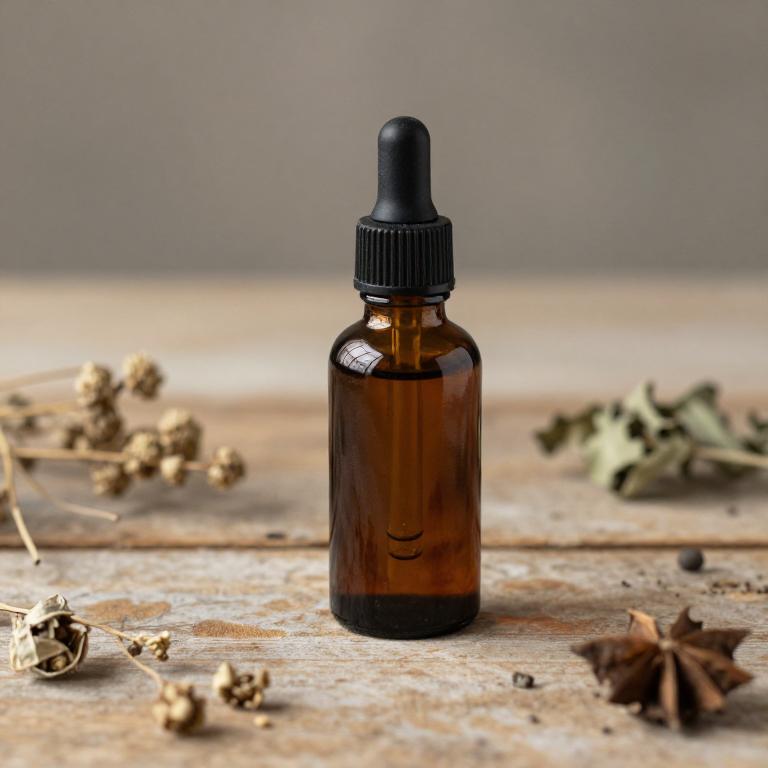10 Best Herbal Tinctures For Aging

Herbal tinctures have gained popularity as natural remedies for addressing the signs of aging, offering a holistic approach to skin and overall wellness.
These concentrated liquid extracts are made by soaking herbs in alcohol or glycerin, which helps preserve the active compounds and enhance their potency. Commonly used herbs such as calendula, rosemary, and green tea are known for their antioxidant and anti-inflammatory properties, which can help reduce wrinkles and improve skin elasticity. When used topically or ingested under professional guidance, herbal tinctures may support cellular repair and promote a more youthful appearance.
However, it is important to consult with a healthcare provider to ensure safety and efficacy, especially for individuals with allergies or existing health conditions.
Table of Contents
- 1. Ginkgo (Ginkgo biloba)
- 2. Salvia (Salvia officinalis)
- 3. Panax ginseng (Panax ginseng)
- 4. Turmeric (Curcuma longa)
- 5. Thistle (Silybum marianum)
- 6. St. john's wort (Hypericum perforatum)
- 7. Ashwagandha (Withania somnifera)
- 8. Chaste tree (Vitex agnus-castus)
- 9. Echinacea (Echinacea purpurea)
- 10. Centella (Centella asiatica)
1. Ginkgo (Ginkgo biloba)

Ginkgo biloba herbal tinctures are derived from the leaves of the ancient ginkgo tree, known for its potent antioxidant and neuroprotective properties.
These tinctures are often used to support cognitive function and may help improve memory, focus, and mental clarity, making them a popular choice for individuals concerned with age-related cognitive decline. The active compounds in ginkgo biloba, such as flavonoids and terpene lactones, are believed to enhance blood flow to the brain and reduce oxidative stress. While some studies suggest potential benefits, results can vary, and it is important to consult with a healthcare provider before use, especially for those taking other medications.
Overall, ginkgo biloba tinctures are a natural supplement that may offer supportive benefits for aging individuals seeking to maintain mental acuity.
2. Salvia (Salvia officinalis)

Salvia officinalis, commonly known as sage, has been traditionally used for its medicinal properties, and its herbal tinctures are gaining popularity for their potential benefits in supporting aging health.
These tinctures are often made by soaking the dried leaves of the plant in alcohol, allowing the active compounds such as rosmarinic acid and flavonoids to be extracted. Sage tinctures are believed to support cognitive function, memory, and mental clarity, making them a popular choice for individuals seeking natural ways to maintain brain health as they age. Additionally, they may help in managing hormonal imbalances and reducing inflammation, which are common concerns during the aging process.
Due to their concentrated nature, sage tinctures are typically used in small doses and are often recommended as a complementary therapy alongside a balanced diet and lifestyle.
3. Panax ginseng (Panax ginseng)

Panax ginseng herbal tinctures are widely used in traditional medicine for their potential benefits in supporting vitality and longevity, particularly in aging populations.
These tinctures are made by soaking the root of the Panax ginseng plant in alcohol or another solvent to extract its active compounds, such as ginsenosides, which are believed to have adaptogenic properties. Research suggests that Panax ginseng may help reduce the effects of stress, improve cognitive function, and enhance energy levels, making it a popular choice for older adults seeking natural health support. However, it is important to consult with a healthcare provider before use, as it may interact with certain medications or have side effects in some individuals.
Overall, Panax ginseng tinctures are seen as a complementary approach to promoting wellness and managing the challenges of aging.
4. Turmeric (Curcuma longa)

Curcuma longa, commonly known as turmeric, has been widely studied for its potential benefits in supporting healthy aging through its active compound, curcumin.
Herbal tinctures made from Curcuma longa are concentrated liquid extracts that provide a bioavailable form of curcumin, making it easier for the body to absorb and utilize. These tinctures are often used to support joint health, reduce inflammation, and enhance cognitive function, all of which are important aspects of aging. Additionally, curcumin's antioxidant and anti-inflammatory properties may help protect cells from oxidative stress and age-related damage.
When used as part of a holistic approach to wellness, Curcuma longa tinctures may contribute to maintaining vitality and supporting the body's natural processes during the aging years.
5. Thistle (Silybum marianum)

Silybum marianum, commonly known as milk thistle, is a herbal remedy that has been traditionally used for its potential liver-protective properties.
Its active compound, silymarin, is often extracted into tinctures to support liver function and detoxification processes. Silybum marianum tinctures may also offer antioxidant benefits, which can contribute to skin health and overall cellular rejuvenation. As people age, the liver's natural detoxification abilities may decline, making silybum marianum tinctures a popular choice for supporting aging bodies.
However, it is important to consult with a healthcare professional before starting any herbal supplement, especially for individuals with pre-existing medical conditions or those taking other medications.
6. St. john's wort (Hypericum perforatum)

Hypericum perforatum, commonly known as St. John's Wort, has been traditionally used for its potential benefits in supporting mental health and emotional well-being, particularly in addressing mild to moderate depression.
Herbal tinctures made from Hypericum perforatum are often prepared by soaking the dried plant material in alcohol, which helps extract its active compounds, including hypericin and hyperforin. These tinctures are valued for their ability to promote a sense of calm and balance, making them a popular choice for individuals seeking natural remedies for stress and age-related emotional challenges. When used as part of a holistic approach, Hypericum perforatum tinctures may support cognitive function and mood stability in older adults.
However, it is important to consult with a healthcare professional before use, as they can interact with certain medications and may not be suitable for everyone.
7. Ashwagandha (Withania somnifera)

Withania somnifera, commonly known as ashwagandha, is an adaptogenic herb widely used in Ayurvedic medicine for its potential health benefits, including its effects on aging.
Herbal tinctures made from Withania somnifera are believed to support longevity by reducing oxidative stress and inflammation, which are key contributors to the aging process. These tinctures may also help regulate the body's stress response through their impact on cortisol levels, promoting a sense of calm and balance. Additionally, ashwagandha tinctures are often associated with improved cognitive function and enhanced immune support, which are important factors in maintaining vitality as one ages.
As a result, Withania somnifera tinctures are increasingly being incorporated into holistic approaches to aging and wellness.
8. Chaste tree (Vitex agnus-castus)

Vitex agnus-castus, commonly known as chasteberry, is a traditional herbal remedy often used in tincture form to support hormonal balance, particularly in women experiencing symptoms of aging such as menopause.
These tinctures are valued for their potential to alleviate hot flashes, mood swings, and irregular menstrual cycles by influencing the hypothalamic-pituitary-adrenal (HPA) axis and regulating prolactin levels. While research on its efficacy is ongoing, many herbal practitioners recommend vitex tinctures as a complementary therapy for managing hormonal changes associated with aging. The standardized extracts of vitex are typically taken in small doses, often in the morning, to support the body's natural rhythms.
As with any herbal supplement, it is important to consult with a healthcare provider before use, especially for individuals with existing medical conditions or those taking other medications.
9. Echinacea (Echinacea purpurea)

Echinacea purpurea, commonly known as purple coneflower, is a popular herb used in tinctures to support immune health, particularly in older adults.
These tinctures are often made by extracting the active compounds from the plant's flowers and roots using alcohol, preserving their potency. For aging individuals, echinacea tinctures may help reduce the frequency and severity of colds and infections, which can be more common with age. However, it is important to consult a healthcare provider before use, as echinacea may interact with certain medications or conditions.
Despite its traditional use, scientific evidence supporting its efficacy for aging populations remains mixed, emphasizing the need for further research and personalized medical advice.
10. Centella (Centella asiatica)

Centella asiatica, also known as gotu kola, is a traditional herbal plant widely used for its potential benefits in skin health and anti-aging properties.
Centella asiatica herbal tinctures are concentrated extracts that harness the plant's active compounds, such as asiatic acid and madecassic acid, which are known for their skin-repairing and anti-inflammatory effects. These tinctures may help reduce the appearance of wrinkles, improve skin elasticity, and promote a more youthful complexion by enhancing collagen production. They are often used in skincare formulations and may also support overall cellular health, contributing to a natural anti-aging effect.
As with any herbal supplement, it is advisable to consult a healthcare professional before use, especially for those with existing medical conditions or taking other medications.